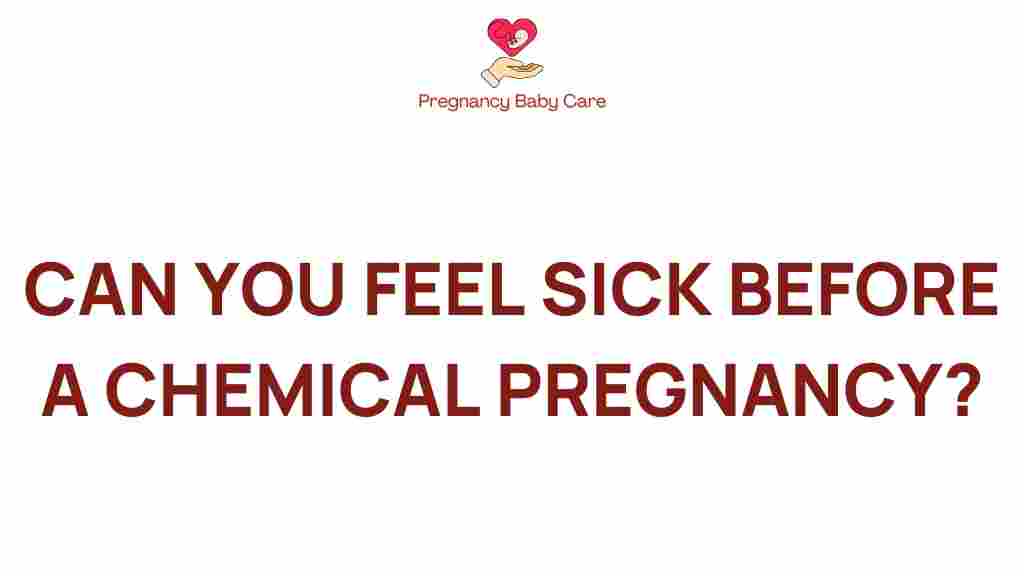Unraveling the Mystery: Can You Feel Sick Before a Chemical Pregnancy?
Understanding the nuances of reproductive health is crucial for women who are trying to conceive or are navigating through various stages of pregnancy. Among the many topics that often arise are discussions surrounding chemical pregnancy and its early symptoms. A chemical pregnancy refers to a very early miscarriage that occurs shortly after implantation. This phenomenon can leave many women feeling confused and concerned about their bodies and overall health.
In this article, we will delve into the early signs of a chemical pregnancy, the hormonal changes that occur during this period, and the emotional impact it can have on women’s health. By the end, you will have a comprehensive understanding of this topic and the various aspects surrounding it.
What Is a Chemical Pregnancy?
A chemical pregnancy is a term used to describe a very early miscarriage that typically occurs within the first few weeks of conception. It is characterized by a positive pregnancy test followed by an early loss, often before the woman even realizes she was pregnant. In most cases, a chemical pregnancy happens before the fifth week of gestation.
Early Symptoms of Chemical Pregnancy
Many women wonder if they can feel sick before a chemical pregnancy occurs. While not every woman will experience symptoms, some common early signs include:
- Light spotting or bleeding
- Mild cramping
- Breast tenderness
- Fatigue
- Changes in mood
These symptoms can be quite similar to those of a normal early pregnancy, which can lead to confusion. Recognizing these signs can help women understand their bodies better and seek appropriate medical advice.
Hormonal Changes and Their Impact
During early pregnancy, significant hormonal changes occur in a woman’s body. After implantation, the body begins to produce hormones such as:
- Human Chorionic Gonadotropin (hCG): This hormone is produced shortly after the embryo implants in the uterus. A rise in hCG levels is what pregnancy tests detect.
- Progesterone: This hormone helps maintain the uterine lining and supports early pregnancy.
- Estrogen: Levels of estrogen also rise during this period to support the pregnancy.
In a chemical pregnancy, the levels of these hormones may rise initially but will fall sharply, leading to the symptoms mentioned earlier. Understanding these hormonal changes can provide insight into the feelings of sickness or discomfort that some women may experience during this time.
Miscarriage vs. Chemical Pregnancy
It’s important to differentiate between a chemical pregnancy and a miscarriage. While both involve loss of pregnancy, a miscarriage typically occurs later in the first trimester or beyond, often accompanied by more significant symptoms such as:
- Heavy bleeding
- Severe cramping
- Pain in the lower back
Recognizing the difference can help women understand their situation better and manage their reproductive health more effectively.
Emotional Impact of Chemical Pregnancies
The emotional toll of a chemical pregnancy can be profound. Women may experience a range of feelings, including:
- Sadness and grief
- Frustration and confusion
- Guilt or self-blame
- Anxiety about future pregnancies
It’s essential for women to acknowledge these feelings and seek support from friends, family, or professional counselors. Sharing experiences with others who have faced similar situations can also be beneficial.
Step-by-Step Process: What to Do If You Suspect a Chemical Pregnancy
If you suspect that you may be experiencing a chemical pregnancy, here is a step-by-step guide on how to proceed:
Step 1: Confirm Your Pregnancy
The first step is to take a home pregnancy test to confirm your pregnancy. If you receive a positive result, you should follow up with a healthcare provider.
Step 2: Monitor Symptoms
Keep track of any symptoms you experience, including:
- Bleeding or spotting
- Cramping
- Changes in mood
This information will be valuable for your healthcare provider in assessing your situation.
Step 3: Consult Your Healthcare Provider
It’s crucial to reach out to a healthcare professional for guidance. They may recommend blood tests to check your hCG levels, which can provide insight into the viability of the pregnancy.
Step 4: Follow Medical Advice
Depending on your situation, your healthcare provider may advise you on the next steps, whether it’s monitoring your condition or preparing for possible loss.
Step 5: Seek Emotional Support
Regardless of the outcome, consider seeking emotional support from friends, family, or support groups. You can also reach out to professionals who specialize in women’s health and emotional well-being.
Troubleshooting Tips for Managing Symptoms
If you are experiencing symptoms related to a chemical pregnancy or early pregnancy in general, here are some troubleshooting tips:
- Rest: Make sure to get plenty of rest to help your body cope with the changes.
- Stay Hydrated: Drink plenty of fluids to stay hydrated, especially if you experience any bleeding.
- Healthy Diet: Focus on a balanced diet rich in vitamins and minerals to support your reproductive health.
- Relaxation Techniques: Consider practicing yoga, meditation, or other relaxation techniques to manage stress and anxiety.
Conclusion
In conclusion, understanding the phenomena of a chemical pregnancy and its early symptoms is crucial for women’s reproductive health. While it is possible to feel unwell before a chemical pregnancy, not all women will experience symptoms. The hormonal changes that occur during this time can lead to a mix of emotions and physical sensations.
If you suspect you are experiencing a chemical pregnancy, it is essential to consult with a healthcare professional and seek the necessary emotional support. Remember, you are not alone in this journey, and there is help available.
For more information on women’s health and emotional well-being, consider visiting this resource. And for further reading on reproductive health topics, check out our article here.
This article is in the category Pregnancy and created by PregnancyBabyCare Team
